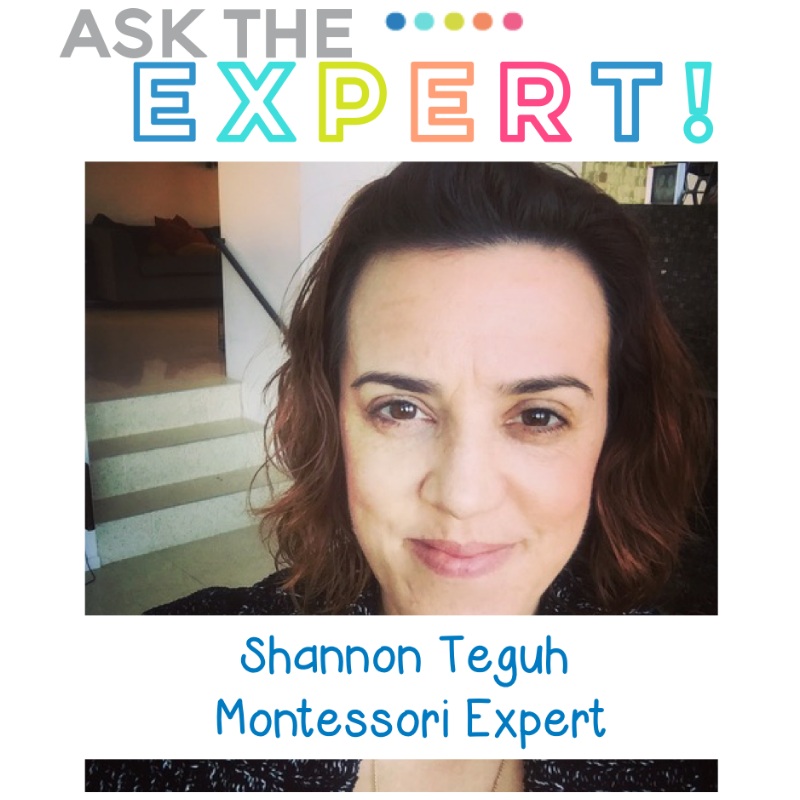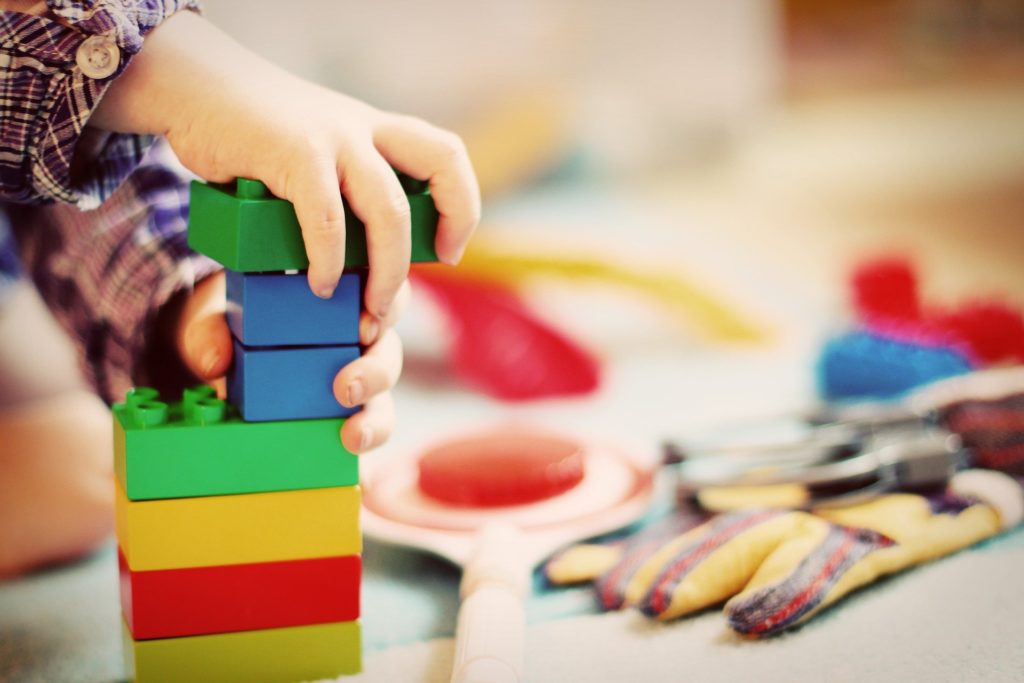Montessori is word that you see often in the education world, but I have found that many of us don’t totally understand what Montessori is. I was so excited to chat with my friend Shannon about the Montessori learning style!

Let’s start with a little bit about Shannon:
Shannon Teguh is a stay at home mom, and the founder/mom boss of Motherhood Union; a community & resource for Montessori minded mamas. She focuses on using simple materials & activities to use the method without making life more complicated or leaving you feeling overwhelmed. She spent 10 years as a full time nanny which is where built up her knowledge of Montessori. She’s read dozens of books about the method, used it in practice with both nanny kids and her own toddler. Now she’s sharing what she’s learned with other mamas because she believes in it’s ability to make a huge difference in the lives of children & families. She gets her work done during nap times, after bedtime and loves the freedom that being her own boss gives her as a mom. Get this! She has lived in over 16 zip codes across the country thanks to her previous career in horse racing, but now calls sunny Southern California home where she lives with her husband, Chris and 3 year old son. She is expecting her second child in May of 2020.
Here is my interview with Shannon:
What is Montessori?
I’m going to give you the short and sweet answer (because we all know that you have about 30 seconds before a child is going to be demanding your attention). Montessori is a childhood education system that was scientifically researched, developed, and structured by Dr. Maria Montessori in Italy in the early 1900s. It is focused on child led education vs teacher led instruction. Traditional education is typically one adult teaching all students the same thing, at the same time, in the same way. Montessori uses thoughtfully prepared activities suited to your child’s “learning windows” so that your child can cultivate their own natural desire to learn in their own time.
Why are you passionate about Montessori?
What I love about Montessori is that it’s a way to truly follow my child’s lead & respect the amazing person that he is. We often treat small children as incapable or helpless, when really they are masters at learning new skills in a short amount of time, with AMAZING retention! Imagine if we had to learn all that these little ones do in such a short amount of time? A new language, how to move through the world from the ground up, how to interact with those around us…
What are the benefits of this approach?
The most immediate benefits of Montessori are seen as your child gains confidence; there will be less meltdowns, less power struggles, & more cooperation. Now, they’re STILL toddlers so emotions run high, but by encouraging independence some of those every day sticking points will disappear. Beyond confidence & independence, Montessori promotes critical thinking, a clutter-free environment (whoo hoooo!!), & a more connected relationship with your child thanks to an environment of collaboration. Children who experience the Montessori approach feel like a valued, contributing member of their home rather than a tiny dictator in charge of a country they have no idea how to rule.

What resources are available to help?
At Motherhood Union we believe in creating a community of support for moms who want to get to know more about Montessori, & who are looking for a little guidance through all the information about it that is out there. If you’re just starting out head over and grab our FREE Montessori Must Haves IKEA Shopping List; the top 10 items we love from the Swedish superstore that make setting up a Montessori environment a snap. Once you’ve grabbed that, you’ll automatically be kept in the loop with all of the exciting things we’re working on. I also have a month long course that dives deep into Montessori without requiring you to read books or scroll through blog posts. Doors are only open a few times a year!This time saving, sanity saving course will lead you step-by-step through everything you need to get started and create a peaceful Montessori learning environment for your child(ren). On Instagram I’m always sharing great ideas for how to use Montessori in your home without a ton of research, hours of prep work, or a whole home redesign. Follow @motherhood_union for daily inspiration.
Reader Questions:
How is a Montessori preschool different than other options?
So one of the biggest differences between traditional schooling options & Montessori based ones (even at the preschool level) is the style of instruction. Traditional preschools will typically teach ONE specific concept to ALL the children at the same time. This is referred to as teacher directed education. If a child is not interested in that concept at the time, they may really resist learning or focusing. In Montessori preschools the approach of child led exploration encourages children to work with materials that fulfill a specific need in their current developmental stage (called a Sensitive Period – or Learning Window which I prefer to call it). They’re given “free reign” to take out & interact with any of the materials set out in a classroom & often exhibit intense concentration and self-motivated learning about complex concepts.
Now, a concern some parents have is “what if my child is never interested in a certain subject? Are they never going to learn to read, or do math??”. It is true that Montessori education does not place as heavy an emphasis on teaching ABCs or 123s with the same intensity as many preschools, but the skills of critical thinking and creating a love of learning ensure that children WILL learn them. And the Montessori method also uses activities and materials that teach these concepts without it being overtly obvious, so children may be practicing pouring liquids, but actually learning scientific principles like volume.
What ages can do Montessori?
Montessori is great because it can be started at infancy and used throughout a child’s life. There are Montessori elementary and high schools, not just preschools. In the early years it is incredibly beneficial to instill a love of learning, increased self confidence, and independent self-responsibility (which actually leads to LESS tantrums and power struggles!!). In the older ages, increasing social awareness and community involvement is emphasized alongside academic pursuits.
Want more Montessori with Shannon?
You can connect with Shannon on Instagram! She shares lots of amazing ideas for easily implementing Montessori in your home!
Check out all of the Ask the Expert posts:
Ask a Speech Pathologist
Ask an Online Party Planner
Ask a Disability Advocate
Ask a Parenting Coach
Ask an Occupational Therapist
